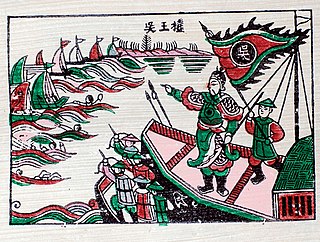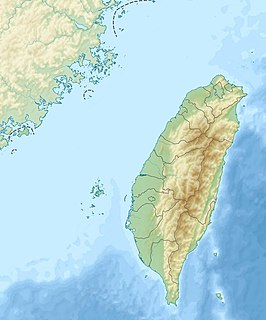 W
WAt the Battle of Bạch Đằng River in 938 near Hạ Long Bay in northern Vietnam the rebel Annamese forces, led by Ngô Quyền defeated the invading forces of the Southern Han state of China and put an end to centuries of Chinese imperial domination in Vietnam during the Five Dynasties and Ten Kingdoms period.
 W
WThe Battle of Baekgang or Battle of Baekgang-gu, also known as Battle of Hakusukinoe in Japan, as Battle of Baijiangkou in China, was a battle between Baekje restoration forces and their ally, Yamato Japan, against the allied forces of Silla and the Tang dynasty of Medieval China. The battle took place in the Baengma River or Baek River, which is the lower reach of the Geum River in Jeollabuk-do province, Korea. The Silla-Tang forces won a decisive victory, compelling Yamato Japan to withdraw completely from Korean affairs and crushing the Baekje restoration movement.
 W
WThe Battle of Caishi was a major naval engagement of the Jin–Song Wars of China that took place on 1161 November 26–27. It ended with decisive Song victory. The Song used gunpowder weapons in their victory.
 W
WThe Battle of Escape Creek was a naval engagement fought between the United Kingdom's Royal Navy and the Qing Chinese naval force on 25–27 May 1857 during the Second Opium War. Commodore Charles Elliot's squadron chased the war-junks at Escape Creek and then, once the British ships were grounded as the river narrowed, they chased them in the ships' boats until all the junks had been overhauled.
 W
WThe Battle of Fatshan Creek (佛山水道之戰) was a naval engagement fought between the United Kingdom's Royal Navy and the Cantonese fleet of Qing China on 1 June 1857. Commodore Henry Keppel sought out and destroyed the Chinese fleet before advancing to the city of Canton for its capture.
 W
WThe Johnson South Reef Skirmish was an altercation that took place on 14 March 1988 between Chinese and Vietnamese forces over who would annex the Johnson South Reef in the Union Banks region of the Spratly Islands in the South China Sea.
 W
WThe Battle of Liaoluo Bay took place in 1633 off the coast of Fujian, China; involving the Dutch East India Company (VOC) and the Chinese Ming dynasty's navies. The battle was fought at the crescent-shaped Liaoluo Bay that forms the southern coast of the island of Kinmen. A Dutch fleet under Admiral Hans Putmans was attempting to control shipping in the Taiwan Strait, while the southern Fujian sea traffic and trade was protected by a fleet under Brigadier General Zheng Zhilong. This was the largest naval encounter between Chinese and European forces before the Opium Wars two hundred years later.
 W
WThe Battle of Noryang, the last major battle of the Japanese invasions of Korea (1592–1598), was fought between the Japanese navy and the combined fleets of the Joseon Kingdom and the Ming dynasty. It took place in the early morning of 16 December 1598 and ended past dawn.
 W
WThe Battle of the Paracel Islands was a military engagement between the naval forces of China and South Vietnam in the Paracel Islands on January 19, 1974. The battle was an attempt by the South Vietnamese navy to expel the Chinese navy from the vicinity.
 W
WThe Battle of Taku or Dagu Forts was a battle during the Boxer Rebellion between the Chinese military and allied Western and Japanese naval forces. The Allies captured the forts after a brief but bloody battle.
 W
WThe Battle of Tangdao (唐岛之战) was a naval engagement that took place in 1161 between the Jurchen Jin and the Southern Song Dynasty of China on the East China Sea. The conflict was part of the Jin-Song wars, and was fought near Tangdao Island. It was an attempt by the Jin to invade and conquer the Southern Song Dynasty, yet resulted in failure and defeat for the Jurchens. The Jin Dynasty navy was set on fire by firearms and Fire Arrows, suffering heavy losses. For this battle, the commander of the Song Dynasty squadron, Li Bao, faced the opposing commander Zheng Jia, the admiral of the Jin Dynasty. On the fate of Zheng Jia, the historical text of the Jin Shi states:Zheng Jia did not know the sea routes well, nor much about the management of ships, and he did not believe. But all of the sudden they appeared, and finding us quite unready they hurled incendiary gunpowder projectiles on to our ships. So seeing all his ships going up in flames, and having no means of escape, Zheng Jia jumped into the sea and drowned.